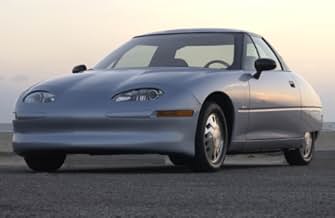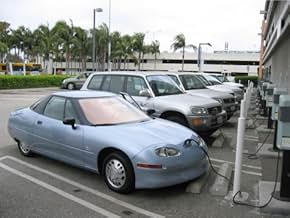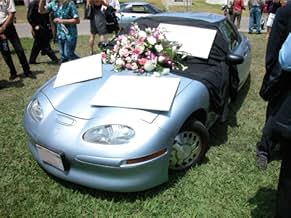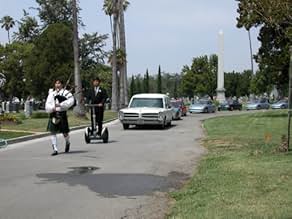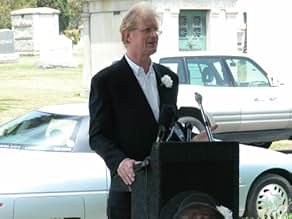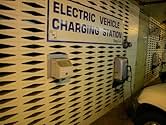Chi ha ucciso l'auto elettrica? - Un giallo che si tinge d'oro nero
Titolo originale: Who Killed the Electric Car?
VALUTAZIONE IMDb
7,6/10
12.855
LA TUA VALUTAZIONE
L'indagine sulla nascita e morte dell'auto elettrica, nonché sul ruolo delle energie rinnovabili e della vita sostenibile nel futuro.L'indagine sulla nascita e morte dell'auto elettrica, nonché sul ruolo delle energie rinnovabili e della vita sostenibile nel futuro.L'indagine sulla nascita e morte dell'auto elettrica, nonché sul ruolo delle energie rinnovabili e della vita sostenibile nel futuro.
- Regia
- Sceneggiatura
- Star
- Premi
- 4 candidature totali
Martin Sheen
- Narrator
- (voce)
Reverend Gadget
- Self
- (as Greg 'Gadget' Abbott)
David Freeman
- Self
- (as S. David Freeman)
Frank Gaffney
- Self
- (as Frank J. Gaffney Jr.)
Recensioni in evidenza
A look into the anticipated introduction of electric cars in the mid '90s to their mysterious recall a few years later. The documentary talks to former electric car owners, government personnel and others while examining the automobile industry and the laws that around it. All trying to draw a conclusion about why this clean, efficient, sleek yet affordable vehicle was pushed from the market in the midst of global warming and rising gasoline prices.
The film presents an interesting and largely hidden topic. Giving a brief history of the electric car, which interestingly used to be more popular than gasoline based cars (!!!!), it will leave most viewers scratching their head and wanting to know more. The resulting investigation is surprisingly large in scope and encompasses many things from the highest echelons of government right down to average Joe. All in a brisk 91 minutes.
However, the film is not just interesting, it addresses many concerns that have been rising faster and faster for a while now, which makes it also an important documentary. --- 9/10
Rated PG: "brief mild language." That's funny, Jaws, with all of it's terror, gore and death is rated PG too.
The film presents an interesting and largely hidden topic. Giving a brief history of the electric car, which interestingly used to be more popular than gasoline based cars (!!!!), it will leave most viewers scratching their head and wanting to know more. The resulting investigation is surprisingly large in scope and encompasses many things from the highest echelons of government right down to average Joe. All in a brisk 91 minutes.
However, the film is not just interesting, it addresses many concerns that have been rising faster and faster for a while now, which makes it also an important documentary. --- 9/10
Rated PG: "brief mild language." That's funny, Jaws, with all of it's terror, gore and death is rated PG too.
10lise-36
Director Chris Paine is no dummy. As a onetime owner of an electric car (the EV1) and a savvy filmmaker, he has quadruple checked his factsand they are alarming. Although the electric car obviously depends upon coal or oil for its power, electricity is far cleaner than gasoline in the long run with less carbon output. Additionally, the batteries are recyclable, and electric cars make fewer demands in other environmental ways: There are no oil changes, oil filters, spark plugs and other parts and services that conventional autos require. Each of these parts carries its own environmental cost.
See this film. It has nothing to do with the current price of gas and everything to do with corruption on many levels.
See this film. It has nothing to do with the current price of gas and everything to do with corruption on many levels.
Probably the most alarming thing about this story of how the electric car was literally destroyed is what it reveals about the power of corporations to control our lives. Film maker Chris Paine, himself an EV1 owner, makes it clear that it was big corporations, especially big oil, and most especially General Motors itself, that woke up one day and asked themselves the multi-billion dollar question: Is an economical and efficient electric vehicle really good for business? In the case of the oil companies, obviously not since such a vehicle would not be burning any gas or needing any motor oil. In the case of the car manufacturers themselves, especially GM, which actually spent some very serious bucks on developing the EV1, the answer came as a bit of a surprise. First of all, they asked themselves, in the long run are you going to make more money building small efficient vehicles or behemoths like the Hummer? It didn't take long for them to figure out that the profit margins would be higher with the bigger vehicles. And then they realized that with the EV1 they wouldn't be able to sell many of their combustion-engine parts like oil filters and such. Furthermore, the EV1 was built to comply with California law. Doing some more thinking, GM realized that it would never do to allow some state government to tell them what to manufacture. If things worked out in California, before you know it, the whole nation might very well go plug-in.
So, as shown so vividly in this documentary, the car manufactures and the oil companies bought up or scared enough politicians so that the law requiring zero emissions in California went the way of the dodo. Meanwhile GM, which had been leasing the EV1, recalled them all and literally destroyed them. Paine has some nice footage showing the brand new and near brand new cars being crushed while EV1 lovers protested in vain. Nationally of course we know about the bills congress passed allowing truck-sized vehicles to continue to guzzle gas (mostly SUVs) and how 6,000-pound vehicles were given massive tax breaks for small business owners (mostly anybody but a wage earner).
There is of course plenty of controversy about whether the story presented by Paine (narration by Martin Sheen, by the way) is fair and accurate. I did a little research--there is a ton of information on the Web--and what became obvious after not too long was that the electric car not only is a viable alternative to the combustion engine car but really is the wave of the future whether General Motors and the other car manufacturers know it or not. For now, however, they are not about to change their ways. They have too much of a vested interest in business as it is.
The hydrogen fuel cell red herring is addressed, and, with help from Joseph J. Romm, who wrote The Hype about Hydrogen: Fact and Fiction in the Race to Save the Climate (2004), which I highly recommend, got fed to the dogs. Naturally there is a clip of George W. Bush pretending to support the hydrogen fuel cell car, even though I am sure he knows that economically it's not even close to a match for the electric car. Getting the Great Prevaricator to advance the propaganda put out by the oil and vehicle companies surely is something close to proof positive that it's BS.
Especially watchable is the clip from Huell Howser's PBS show in which we get to see the EV1s not only being crushed but pulverized into little bits for recycling.
So, what's it all about, Alfie? It's just as Eisenhower warned: beware not just of the industrial-military complex taking over our lives, but beware of corporations in general buying up all the politicians and writing all the laws. In fact, with the way the mass electorate is influenced by advertising, only politicians pre-approved through campaign donations from big corporations have a chance of even getting the nomination of either of the two main political parties. And without that nomination, effectively speaking, they can't win.
Regardless of all the machinations by GM, et al., I think our grandchildren will be driving mostly electric vehicles with nary a gas station in sight. And they will be inundated with "green" ads in the media with lots of flowers and little girls paid for by General Motors and Toyota, telling us how they are responsible for the shiny, new clean world.
(Note: Over 500 of my movie reviews are now available in my book "Cut to the Chaise Lounge or I Can't Believe I Swallowed the Remote!" Get it at Amazon!)
So, as shown so vividly in this documentary, the car manufactures and the oil companies bought up or scared enough politicians so that the law requiring zero emissions in California went the way of the dodo. Meanwhile GM, which had been leasing the EV1, recalled them all and literally destroyed them. Paine has some nice footage showing the brand new and near brand new cars being crushed while EV1 lovers protested in vain. Nationally of course we know about the bills congress passed allowing truck-sized vehicles to continue to guzzle gas (mostly SUVs) and how 6,000-pound vehicles were given massive tax breaks for small business owners (mostly anybody but a wage earner).
There is of course plenty of controversy about whether the story presented by Paine (narration by Martin Sheen, by the way) is fair and accurate. I did a little research--there is a ton of information on the Web--and what became obvious after not too long was that the electric car not only is a viable alternative to the combustion engine car but really is the wave of the future whether General Motors and the other car manufacturers know it or not. For now, however, they are not about to change their ways. They have too much of a vested interest in business as it is.
The hydrogen fuel cell red herring is addressed, and, with help from Joseph J. Romm, who wrote The Hype about Hydrogen: Fact and Fiction in the Race to Save the Climate (2004), which I highly recommend, got fed to the dogs. Naturally there is a clip of George W. Bush pretending to support the hydrogen fuel cell car, even though I am sure he knows that economically it's not even close to a match for the electric car. Getting the Great Prevaricator to advance the propaganda put out by the oil and vehicle companies surely is something close to proof positive that it's BS.
Especially watchable is the clip from Huell Howser's PBS show in which we get to see the EV1s not only being crushed but pulverized into little bits for recycling.
So, what's it all about, Alfie? It's just as Eisenhower warned: beware not just of the industrial-military complex taking over our lives, but beware of corporations in general buying up all the politicians and writing all the laws. In fact, with the way the mass electorate is influenced by advertising, only politicians pre-approved through campaign donations from big corporations have a chance of even getting the nomination of either of the two main political parties. And without that nomination, effectively speaking, they can't win.
Regardless of all the machinations by GM, et al., I think our grandchildren will be driving mostly electric vehicles with nary a gas station in sight. And they will be inundated with "green" ads in the media with lots of flowers and little girls paid for by General Motors and Toyota, telling us how they are responsible for the shiny, new clean world.
(Note: Over 500 of my movie reviews are now available in my book "Cut to the Chaise Lounge or I Can't Believe I Swallowed the Remote!" Get it at Amazon!)
How can you fit decades of events into two hours? And, not appear to have an agenda? Mr. Paine and his crew did a good job creating a synopsis of the events affecting the Electric Vehicle, and its subsequent effect on us as a society. He also more clearly outlined why we should pay more attention to the EV, and how it played such a key role in the history of our country.
The main thrust of this movie is to educate the public about the actions of key players in shaping our society through their policies on transportation and energy, and how powerful those policies have proved to be in affecting us as a nation. I came away with a better understanding of what I had only guessed at before, and I am very glad that Mr. Paine chose to give the concern-inspiring events first but leave us with a sense of optimism for the future.
The only fault I can find with this movie is that it necessarily has to cover a lot of factual information, something that makes it a lot like reading a good book, rather than viewing a movie. But, if it makes you take a good look at why we're paying over $3/gallon for gas, then it's a good book indeed.
The main thrust of this movie is to educate the public about the actions of key players in shaping our society through their policies on transportation and energy, and how powerful those policies have proved to be in affecting us as a nation. I came away with a better understanding of what I had only guessed at before, and I am very glad that Mr. Paine chose to give the concern-inspiring events first but leave us with a sense of optimism for the future.
The only fault I can find with this movie is that it necessarily has to cover a lot of factual information, something that makes it a lot like reading a good book, rather than viewing a movie. But, if it makes you take a good look at why we're paying over $3/gallon for gas, then it's a good book indeed.
As a former engineer with both GM and Ford, I have to thoroughly refute what a previous commenter has stated about likely explanations. With the technology of the powertrain/fuel source development that far along, that far advanced within a viable vehicle, crash-safety and equipment regulations would not have removed this from the marketplace. The "skin" and tub/framework of the vehicle would have been either reworked to comply or the powertrain/fuel source would have been adapted to fit existing car lines that meet crash-safety and equipment regulations. There are plenty of examples of "hurry up" retro-fits in Detroit/Dearborn's history. Unfortunately there is much documented history of technology being quashed, patents being bought and buried, innovations left by the wayside to discourage change, discourage having to retool, reinvent, reinvest...and if you don't think that auto/oil/gov are all complicit in this, how naive can one be? GM and the railroads, the Tucker, fuel injection, Wankel engine, anti-lock brakes...all quashed by powerful companies and people not wanting change no matter what the benefit would be in safety, society, or the environment.
Lo sapevi?
- QuizThe boxy, small EV shown being crushed in the movie was the Honda EV-Plus. They, like the sleek GM EV-1, were only available for lease; several returned to Honda, and were converted into fuel cell demonstration vehicles. For a while, you were able to lease them through EV Rentals (at several Budget Rent a Car locations).
- Citazioni
Mel Gibson: Who writes the history? Um, well... The guy with the biggest club.
- Colonne sonoreJane's Theme
from Il tredicesimo piano (1999) (as The 13th Floor)
Composed by Harald Kloser
Courtesy of Centropolis Entertainment
I più visti
Accedi per valutare e creare un elenco di titoli salvati per ottenere consigli personalizzati
- How long is Who Killed the Electric Car??Powered by Alexa
Dettagli
- Data di uscita
- Paese di origine
- Lingua
- Celebre anche come
- Who Killed the Electric Car?
- Luoghi delle riprese
- Aziende produttrici
- Vedi altri crediti dell’azienda su IMDbPro
Botteghino
- Budget
- 1.000.000 USD (previsto)
- Lordo Stati Uniti e Canada
- 1.678.874 USD
- Fine settimana di apertura Stati Uniti e Canada
- 45.138 USD
- 2 lug 2006
- Lordo in tutto il mondo
- 1.764.304 USD
- Tempo di esecuzione1 ora 32 minuti
- Colore
- Mix di suoni
- Proporzioni
- 1.75 : 1
Contribuisci a questa pagina
Suggerisci una modifica o aggiungi i contenuti mancanti

Divario superiore
By what name was Chi ha ucciso l'auto elettrica? - Un giallo che si tinge d'oro nero (2006) officially released in India in English?
Rispondi

